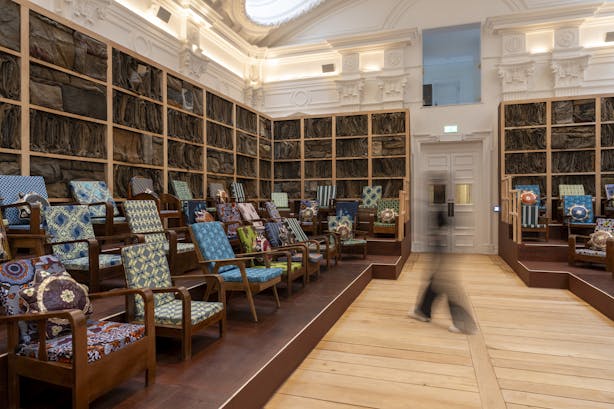
- Exhibition
Parliament of Ghosts
Ibrahim Mahama
Two artists unexpectedly reunited during a residency together in a small snowy town on the East Coast of the United States revisit past feelings and memories.
‘I’m not sure I believe in ghosts.’
Earlier in the evening the power had gone out, so most of the artists on the residency are gathered around the crackling fire in the main hall. Outside the snowstorm roars softly, like someone has turned down the volume.
The statement from Nate had an air of throwaway, but he intended to provoke; and provoke he did, with some murmuring in agreement, many protesting, everyone talking over each other.
Nate, pleased with the chaos he’s created, casually throws another statement to the crowd:
‘Has anyone actually seen a ghost before?’
The conversation slowly quiets down, the room falling into a kind of silence, only interrupted by the occasional pop from the wood meeting fire in the furnace.
‘I have.’ All eyes turn towards Max, the glow from the fire dancing against his skin.
Nate takes this challenge with excitement, a smile playing on the edge of his lips. ‘Well?’
Max looks around the room at these expectant faces. ‘Well, after my father died, I began to feel like I was being watched by a version of him I had never known.’
Across the room, Annie took him in. Max was of special interest to her, not just because they were the only Black artists at this residency, somewhere on the East Coast of America, just past Boston, a little further until you were deep in a woodland state, the urban environments she’d grown used to in London giving way to large houses with larger, sprawling grounds, all of this framed by hardwoods, Elms and Maples, Red Oaks towering over all. Not just because she’d run her fingers along his name on the noticeboard when she arrived a week before him, seeing Osei and realising that he, like she, was Ghanaian. Not just because she’d overheard his laughter from a distance, and it made her feel like she was in a memory of a different version of her. But mostly, because there was a point in her life when she loved this man and, maybe, she still did.
‘In Ghana’, Max continues, ‘funerals are serious affairs. It’s not only an opportunity to say goodbye but to celebrate life. And celebrate we did, for days and days. But each night, climbing into my childhood bed, I began to feel like I wasn’t alone. I couldn’t see anything or anyone in the room. But I could feel something.’
Max chooses this moment to meet her gaze. For a brief moment, his features soften, each flicker of the fire illuminating his mournful glow. He blinks once, twice, and looks like he might say something to Annie directly.
But then the guise falls away, or rather, the mask returns. He’s back to performing again.
‘It was only a few days later when proceedings were done, and I was finally alone in the house and had some quiet …’
Annie used to love when he told stories like this, until it had started to annoy her, this performativity of his obscuring their every conversation; the public version of him broaching their private, intimate moments; when she’d asked him why he did that, why he couldn’t turn it off, why he couldn’t be with himself, and when he couldn’t give an answer, well, that had been that.
‘Well, I was in my father’s room. Sitting on the edge of his bed. And I began to hear footsteps. Which was impossible. I called out, wondering if a relative had returned. No response. The footsteps grew closer, but I didn’t feel panicked. A great calm came over me. Moments later, the door creaked open, and someone joined me in the room.’
Max gazes to her again, this time his eyes aflame, a tiny smile on his face, before turning back to his excited audience.
Around midnight, the snow finally abates, and some of the artists disperse back across the 400-acre grounds to the cabins scattered around which double up as studios. Most of the paths and roads of the grounds are unlit and the sky is starless, the moon absent, so Max and Annie swing their torch beams as they walk. The snow is soft yet deceptive, hardening with each step so that after a few hundred yards, they begin to trudge slowly.
‘It’s been a while’, Max says.
Annie doesn’t look at him. ‘It has.’
‘How you been?’
‘We … don’t have to do all that.’
‘Well, we’re gonna be here for …’ Max feigns checking the time on his watchless wrist, ‘Six weeks? So …’
Annie shakes her head with a tiny sound of playful annoyance. He knows he’s won her over. They continue to haul along the trail, snow turning to ice which cracks underfoot. Annie roots around in her pocket, withdrawing a slender, pre-rolled joint. As she searches for a lighter, Max asks, ‘How’d you get that here from London?’
‘I came through New York.’
‘You got a prescription for that?’
Annie finally pulls out her lighter. Frowns. ‘Are you the police?’
‘No, no, nothing like that’, Max says, hiding his own worries. Annie lights the joint on the first attempt, taking two quick tokes, blowing out a thick plume of smoke. She offers it to Max, who hesitates, if only for a moment, before taking it from her. The joint loosens them both, puts them back into a familiar rhythm, the intimacy of an illicit smoke in the darkness.
Max, feeling braver, points to her hair, shorn close to her head. ‘When d’you lose the dreads?’
‘Erm ... recently.’
‘Suits you.’
Annie presses the joint between her lips to stop her smile spreading too quickly. After another exhale, ‘You still painting? Guessing that’s why you’re here?’
Max offers her a smile as a placeholder. He’d always loved images – however they had come. Photographs, films, drawings, whatever vehicle could be used to give memory and emotion some motion, some propulsion that might dig deeper into the heart of an issue, might dig deeper into someone’s heart. But he’d started painting in earnest around 19 or 20, when his father, Nicolas, was diagnosed with Alzheimer’s. He quickly found it was easier for his father to recognise a version of himself, of the world he had known, in images. And so Max began to paint and to paint quickly because he always felt his father was living on borrowed time.
Nicholas used to be a fisherman, and so Max painted him at that place where shore meets water, shoving the boat into the ocean; painted him hauling in nets of tilapia, triumphant; painted him, hand on heart, singing to comfort himself on the days the nets came up empty. And when his father passed, Max felt like his father had taken the boat out by himself, into the endless ocean; and Max had been searching for him since.
‘I still paint some but after Dad … I wanted to do something like him, with my hands. So, I’ve been sculpting. Mostly woodwork.’ Before Annie can pry further, he asks, ‘What about you? Still writing?’
Annie gives him a tiny smile. ‘Still trying to make sense of some things.’
They walk on, the silence finally comfortable. Max starts to ask after her mum, but before he can, Annie declares, ‘This is me.’ They come to a halt. Max tries to hand her back the joint, but she gestures for him to keep it. ‘How far are you?’
‘Next one along. Not more than 10 minutes away.’
‘Of course you are’, Annie says, smiling, jangling her keys in her hand.
Max thrusts his hands into his pockets. ‘Maybe see you at breakfast?’
‘Maybe’, she says, retreating into her cabin, leaving Max to wander out into the starless night, alone.
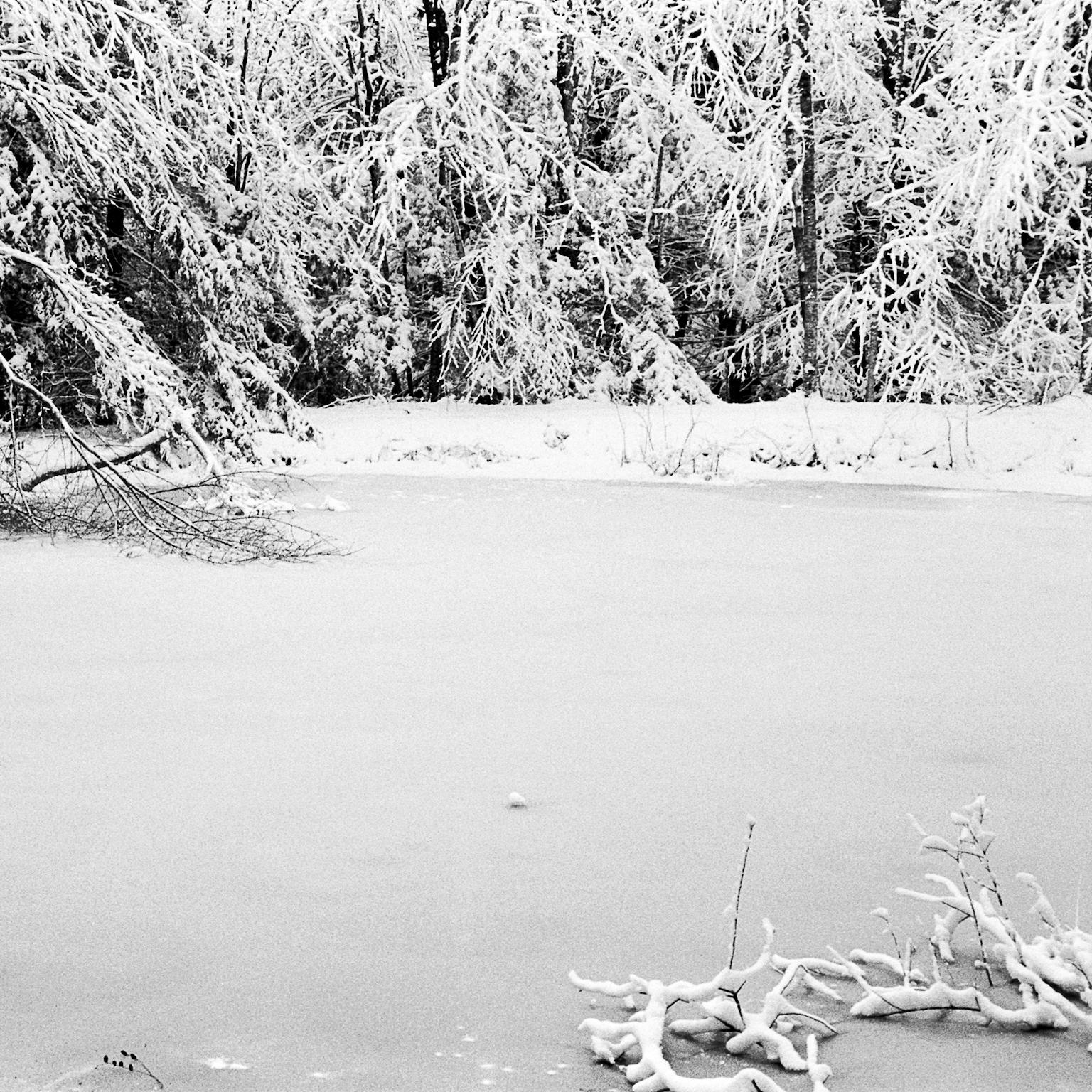
Caleb Azumah Nelson, Meet Me There (2025), photograph. Courtesy of the author.
Max wakes with the mid-morning sun lazing across his face, sneaking through a gap in the curtains. By the time he reached his cabin, all plans to take some quiet moments with himself evaded him, and instead, he collapsed onto his bed. The joint had made him feel legless and headless and sent him into a slumber full of dreams, all of them slightly out of reach.
Sitting up, he checks the time. 11.12 a.m. Breakfast is out of the question. Lunch might be too far a reach. He checks the maps on his phone. The town is closer than he thought, a 25-minute walk. He groans as he sits up, reaching for his boots.
The air is brisk, but it’s not nearly as cold as he thought it would be. The path through the woods to get outside of the residency grounds is barely that, just softer ground where more feet have tread. All around him, trees tower, the world is quiet and unmoving. As he walks, he chuckles to himself: the sentry of trees on either side reminds him of the entrance to the Aburi Botanical Gardens, a place he and his father would visit whenever Max was back in Ghana, a place equally as quiet.
Before long, he’s reached the town: a row of quaint craft stores, bookended by a haberdashery and a record shop, and on the next road over, a small shopping complex, Target’s red letters gleaming even in the brightness of the day. He grabs a burrito from the family-owned Mexican restaurant in the complex, inhaling the food in minutes, and, gifted with a hot, sugary bag of churros as he was paying, slowly walks the circumference of the town centre, taking it all in. It’s quiet for the middle of day, but those who do pass him offer a small nod, a tiny smile. A woman stops him to ask what he’s doing here. The question takes him aback, but he realises he’s a stranger in the village; he vaguely points in the direction of the residency, and her face softens into a welcome as she gives him the inside knowledge of this small town, what shops to visit and where avoid, who else, in the 50 years she has lived in the town, she met from the residency. When she leaves him, he does another circle, the drifting away. The only shop appealing to him is the record store – there’s an old player in his studio with a single speaker attached that he’s sure he can get working – and so, dusting the sugar off his hands, he goes in, a bell above the door announcing his arrival.
It’s a tiny shop – he reckons he could touch either wall if he fully extended his arms – but most of the space is taken up by crates overflowing with records. The shopkeeper smiles warmly to Max as he enters, nodding to the music playing, what Max recognises as Joe Bataan’s longing voice. Max exhales, easing into the space. Heading straight for the soul section. Rifling through Minnie Riperton and Donny Hathaway and Bill Withers, not knowing what he’s looking for, not until he pulls out a battered copy of Marvin Gaye’s I Want You.
A small smile spreads across Max’s face as memories of a slow summer afternoon rush back to him. An artist grant received a decade ago had meant he could rent his first flat after art school – a poky conversion in Peckham, South London. He and Annie would spend afternoons with their legs tangled on the sofa, as they did that day, Marvin Gaye yearning from the speaker, dreaming of a life they longed for together. Those days with Annie had cast a bright, warm ray across his life. They had been his sun. But night would always fall. And with it would come a specific haunting of the grief he couldn’t shift. Every time he would remember his father, the haunting would grow larger and larger, obscuring the sun, his days, his vision, until it wasn’t just that he couldn’t see Annie anymore, but he couldn’t see himself. Max’s smile turns bittersweet.
‘Another storm’s coming’, the shopkeeper says, smiling. ‘That’s the kind of music that’ll keep you warm.’
Max considers. Before yesterday, it had been several years since he had seen Annie. But their quiet walk in last night’s darkness, the appearance of the record; he wasn’t deluded but it felt like something was pressing in on him that he couldn’t ignore. (The pull towards her was still there and maybe it was for her too.) ‘I’ll take it,’ he says, the shopkeeper ringing him up. Max leaves the shop, striding back towards the residency, humming Marvin as he walks. He’s walking quicker than he realises and, in his excitement, he must have taken a wrong turn, because he finds himself in a clearing he doesn’t recognise from his earlier journey. He can’t work out whether he’s in someone’s yard or in vacant space, but he can hear the rush of water, can feel more ease entering his spirit with the possibility of stillness a river or stream might present him, and going towards it –
‘Hey!’ The voice is loud, firm. Max turns to face its owner. He’s still smiling when he realises the stance of the owner – a short, stocky man, sunglasses shielding his eyes – isn’t warm, but somehow both defensive and threatening, accented by the pistol on show on his hip, the man’s hand on its hilt.
Max freezes. The world around him stops. All he can hear is the sound of rushing water and the thud of his heart. He was warned that it’s an open carry state. But he had not expected this kind of intrusion, not this morning.
It takes everything in him to start slowly backing away. He doesn’t raise his hands because he knows his bag might cause further alarm, might cause further misunderstanding, might encourage the man to take on the role of hunter and assign Max with the role of prey. So Max just backs away. When it’s safe to turn, he does, his stride picking up pace. He doesn’t stop until he’s made his way back on the residency grounds, back into his studio, shedding as many layers as if he could shed the weight of the previous moments. When, after a few minutes, his heart slows, he reaches for a sketchbook, splaying it open. Usually, in moments like these, this specific grief, he would draw a self-portrait, a way to renegotiate the lines with which he had been – wrongly – drawn, a way to say I am here. But today, he finds himself drawing dark, curious eyes, a mouth, always quick to smile, a newly shorn head. He finds himself drawing Annie, which was another way of saying, he feels most himself in her presence.
Meanwhile, Annie is taking her usual afternoon wander through the woods, a daily practice she had started the day after arrival. She isn’t generally someone who finds solace in nature, but on her first morning, a deer had galloped softly by her window, darting quickly into the woods when she’d thrust open the door to verify what she just saw. Since then, for the past week, around 2 p.m., she crunches through unmarked paths, looking for other animals. Along with the deer, there were said to be wood turtles and hares and the occasional coyote. The black bears were rumoured to be hibernating, although she’s unconvinced. Still, she wanders, daily, a camera swinging from around her neck, hoping to glimpse something that might bring her the same sense of wonder as the deer did.
The path always brings her to the lake, which is her natural resting point, and since she’s been coming here, is completely frozen over. She pulls off a glove and lights another joint. Watches her breath cloud the air. Annie never smokes the whole joint, just until the edges of the day become soft and round. She sits and lets the quiet wash over her. Daily, she wrestles with her desire to step onto the sheet of ice spread across the surface. She wonders if the lake is like a mind, how much force it could take before it cracks, shatters.
For the past few days, on her return, she passes a tree that makes her stand still. It’s not especially tall – maybe twice her height – and it looks to have been gnarled by weather and time, the trunk puckered, the branches skinny and boughed. But it has a heft to it she cannot shake. It reminds her of an artwork she saw in London more than a decade prior: a single image of a tree among vegetation, mounted on a light box, the tree itself innocuous but the context, its part in the history of violence perhaps not always seen, but felt. Each day she has visited this tree, she’s oscillated between dismissing her heaviness and reminding herself that in the modern world, history isn’t ancient, and all violence is possible.
As she turns to leave, she’s struck by a surge of anger. She strides towards the tree, putting one hand on the trunk, then the other. She shoves with all her might, pushing at the tree to test its strength, but her feet only slip and slide. The tree stands firm. Annie steps back before she falls, folding her arms. Her anger doesn’t abandon her, but it does cool.
As she traces her steps back, she hears the dull thrum of an engine, tyres slipping over a dirt road. The car grows closer; she sees Karl, one of the residency administrators, behind the wheel.
He comes to a stop beside her and slides down his window, offering her a smile. ‘How you doing?’
Annie, wary, answers, ‘Fine.’
‘Nice day for a walk. Not as cold as it will be in a few days.’
She makes a sound of agreement but doesn’t offer much more. Karl offers another smile, gazing over at where she just came from. He puts the car in gear but not before saying, ‘You should quit smoking. It’s bad for your health.’ Annie frowns, as he waves goodbye, driving off. She checks her hands, touches behind her ear to see if she mistakenly left the joint there. No, the only way Karl could’ve known is if he had been watching her. More anger arrives, her hands balling into fists. She sighs deeply and tries to shake it off.
Returning home, she finds an envelope wedged underneath her door. Back inside, perched at her desk, she tears it open to find an image of her. She takes in the drawing, knowing immediately this came from Max’s hand. It’s her – inquiring eyes, the ways her lips are curved that always looks like she’s smiling slightly – but she isn’t used to seeing herself like this. She isn’t used to seeing herself at all recently. She feels another wave of anger – feels like Max has been watching her too, observing, collating all he can into his single image. She flings the image across the room, and puts her head in her hands, somehow trying to both collect herself and push it all away.
Days pass. The sky turns white, like it too is frozen over. The temperature drops as the arctic storm returns. Max and Annie find rhythms on differing timelines. He breakfasts early, just after dawn has broached the sky, and spends the rest of his day immersed in his work, only emerging for other meals. Her hours shift: she sleeps in until 2 or 3 p.m., not sleeping until 5 or 6 a.m., her waking hours spent pouring over books, attending to her own work, one sentence at a time.
She’s at her desk, around 4 p.m., the sun already threatening to set, when, looking around her cabin, she catches sight of the image Max drew of her, discarded in the corner, unattended to. A fresh surge of anger courses through her, and then her boots are on, her coat is on, she’s pacing towards Max’s cabin, her hand balled in a fist as she bangs on his door, and spotting him through the window, head boughed over some diagrams, headphones on, she bangs harder and harder until he turns towards her, surprised, striding past him into his cabin as he opens the door –
‘Annie. I haven’t seen you in days. Are you –’
‘Why did you do this?’ She’s holding up the image of her.
Max leans against the desk, gazing at her, then gazing away, trying to think of an answer that might satisfy.
‘Well?’ Annie asks.
‘I …’ He throws his arms, shrugs. ‘I just wanted to say … it was nice to see you. That I see you.’
Annie takes several deep breaths. His words knock the wind out of her. After a few moments, she takes a seat on the edge of his bed. Max joins in the quiet.
‘I didn’t think I believed in ghosts,’ she says. When he frowns, she sighs several times, trying to muster the words. When they come, they’re simple: ‘Mum passed. Last month.’ Instinctively, he takes her hand, understanding what she’s saying. They stay like this for a while, unmoving. Annie sighs, closing her eyes.
‘D’you remember, years ago, we went to a gallery, and there was an image of a tree, mounted on a light box’
‘I can’t forget it’, Max says.
‘There’s a tree in the woods, just like that. It makes me …’ her hands ball into fists once more. ‘Angry. Makes me feel endlessly sad.’
Max gazes at her for a moment before standing, offering his hand, ‘Come.’
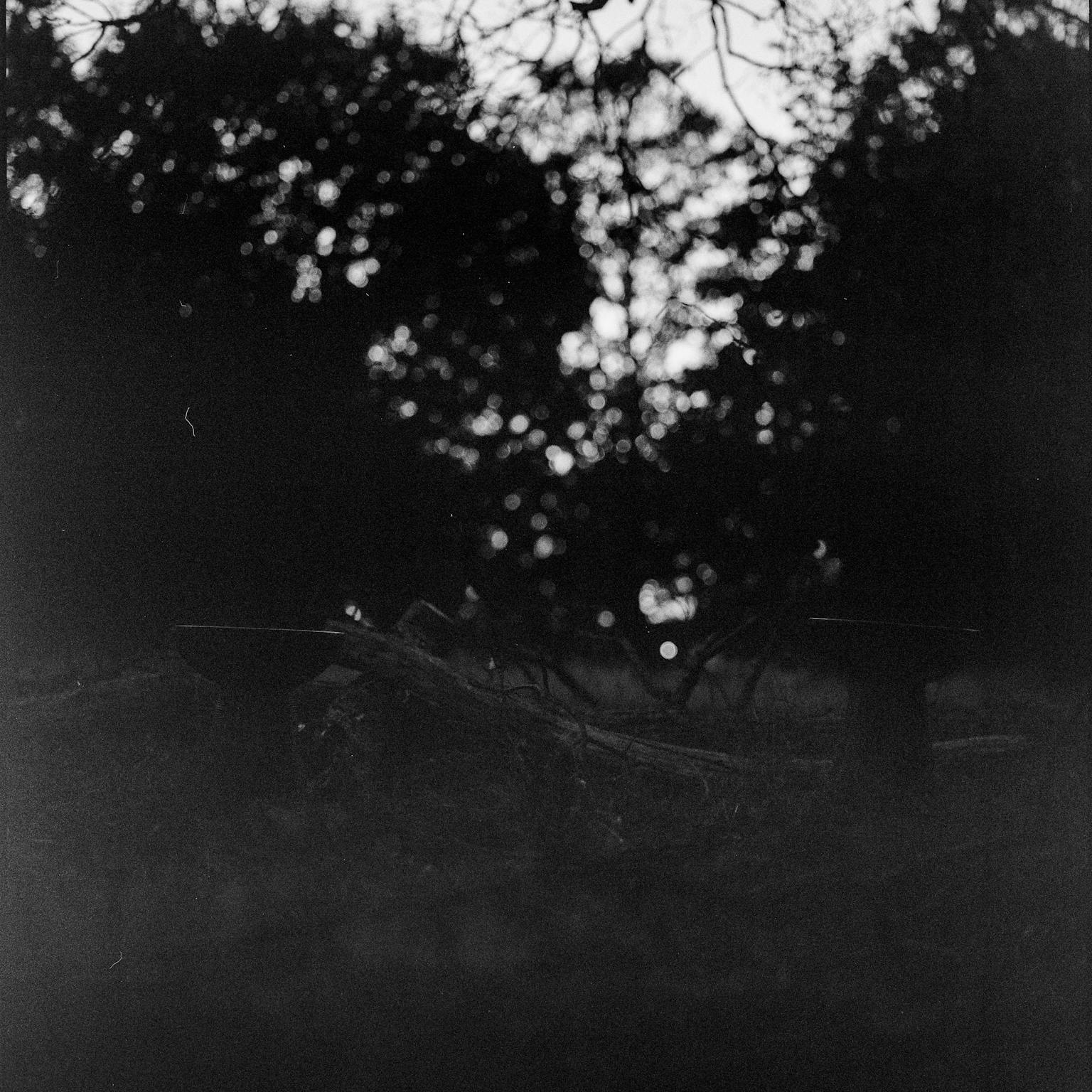
Caleb Azumah Nelson, In This Room (2025), photograph. Courtesy of the author.
Outside is bitter with cold. Max allows himself to be led by Annie onto an unmarked path, a saw swinging by his side. They crunch through the undergrowth, seeing no animals but both feeling alive as they traverse this wild terrain. They walk for about 20 minutes until they approach the tree. They both stop for a moment. Max is taken aback by the space it takes in the landscape. He exhales, approaching the trunk.
‘We’re gonna get in trouble for this’, Annie says.
‘Are you the police?’ Max asks, grinning. Annie shakes her head smiling, as Max unsheathes the saw and gets to work.
Minutes pass. For a while, Max’s saw does nothing. It’s like the tree is stuck in time, it can’t come or go, haunted by something. And then, with a slight groan, the tree’s flesh gives. Max works quickly, until he nods at Annie to stand back. The tree falls, landing with a dull thud. A history of violence lying down at their feet. Max takes his saw to the trunk once more, chopping off a section.
Back in his studio, they lug the carcass into Max’s workshop. He grabs the diagrams from his desk and spreads them across the workshop table.
‘Stools’, he says. ‘Somewhere to rest.’ She nods, understanding. He hands her a pair of ear defenders, and putting on his own pair gets to work. For what feels like days, he shaves the trunk down and begins to shape and refashion the wood. It starts to snow again, and Annie lights a crackling fire, using the discarded pieces of the trunk. She returns briefly to her cabin, coming back with her camera swinging from her neck, making images of Max as he works. Her gaze is saying, I see you, too.
When he’s done, the finished sculptures resemble hourglasses, as if it were possible to sit on the sands of time. Max leaves the wood untreated, unfinished, because this kind of grief is never really done. He places the stools near the fire and invites Annie to sit with him. She smiles as they take their places on the stools. It’s quiet, aside from the crackling fire, the soft roar of the snowstorm. A great calm comes over them both. And moments later, the door creaks open, and someone joins them in the room.

Ibrahim Mahama
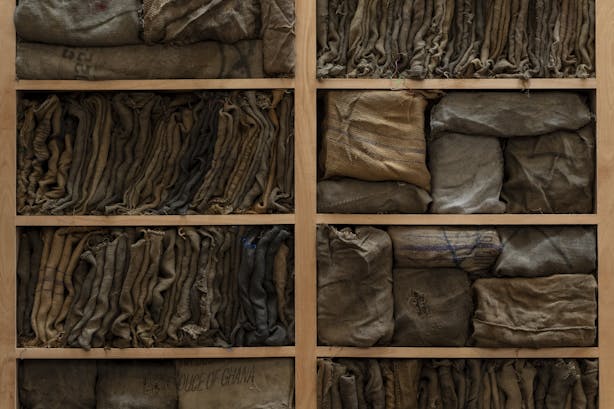
Ibrahim Mahama & Shumon Basar
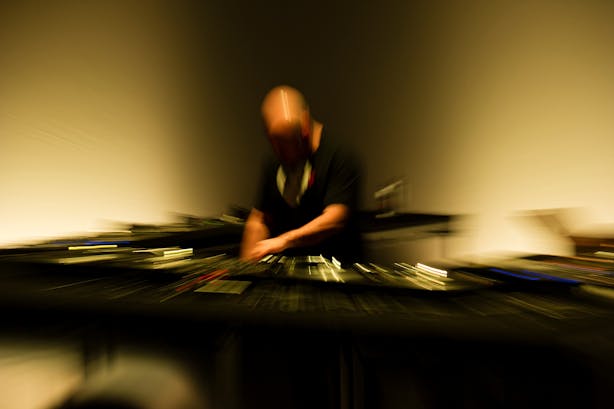
Raed Yassin